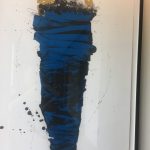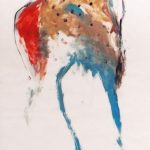Rick Bartow
Rick Bartow (1946–2016) born in Newport, Oregon, a Native American artist and a member of the Mad River Band of Wiyot Indians, a small tribe indigenous to Humboldt County, California. One of most nationally recognized Native American artists, Bartow created pastel, graphite, and mixed media drawings, wood sculpture, acrylic paintings, drypoint etchings, and monotypes.
Bartow attended Western Oregon University and graduated in 1969 with a degree in secondary art education. In 1969 he was drafted into the army and sent to Vietnam serving there from 1969 to 1971 as a teletype operator and as a musician in a military hospital, for which he was awarded the Bronze Star. After a number of small shows in the Newport area, Bartow was offered a solo exhibition in 1985 by William Jamison of Jamison/Thomas Gallery, who operated galleries in Portland and New York City. Bartow exhibited frequently at both locations and elsewhere, and his work began to garner national attention. Following Jamison’s death in 1995, Bartow signed on with Froelick Gallery in Portland, which continues to represent the artist’s estate.
Bartow’s work can be found in numerous museum collections including the Brooklyn Museum (New York), the Peabody Essex Museum (Massachusetts), Eiteljorg Museum of American Indians and Western Art (Indiana), the National Museum of the American Indian (Washington, DC), the Hallie Ford Museum of Art (Oregon), the Heard Museum (Arizona) and the Portland Art Museum. His carving The Cedar Mill Pole was displayed in the Jacqueline Kennedy Garden at the White House in 1997, and has been designated one of the most highly regarded Native American public sculptures in the country (now installed in Portland).
In April 2015 the Jordan Schnitzer Museum of Art at the University of Oregon opened “Things You Know but Cannot Explain”, a major retrospective exhibition of Rick Bartow’s works in many media, spanning 35 years of his career with ten museum venues from 2015–2019 (Oklahoma, North Dakota, New Mexico, Arizona, Washington, Idaho, Illinois and California) as well as the High Desert Museum in Bend.
Bartow was also a musician and singer with his own band, Bartow and the Backseat Drivers.
Rick Bartow, who struggled with PTSD and substance abuse related to his experience of Vietnam, visited Rock Creek Campus in 1994 and said to an audience of faculty and students, “If you want to live a passionate and ecstatic life, get sober and start painting.”


